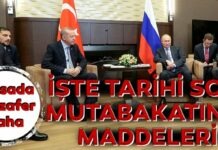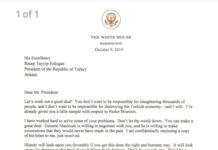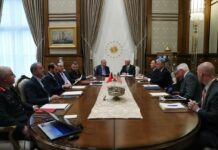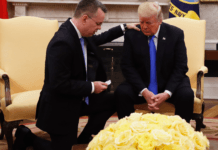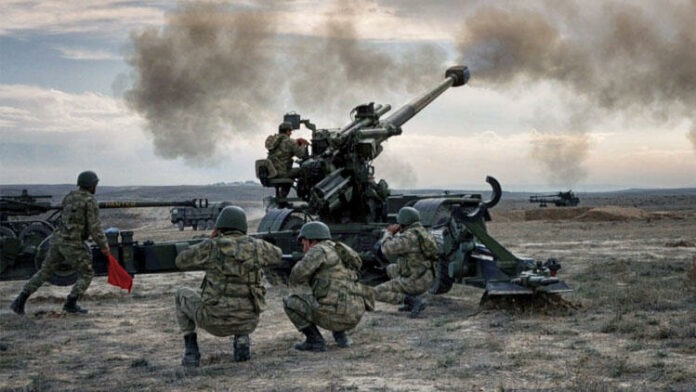
Numan Kurtulmuş, a leding figure of AK Party and the vice president of the party, said: “We are entering into a war.” When I heard of his words in the afternoon yesterday, I wondered where President Tayyip Erdoğan was at that moment.
I learned that he was in Serbia. . .
I couldn’t help but think over what it possibly meant that President Erdoğan was in abroad when the whole world was discussing about Turkey’s preparation for a military operation in Syria in company with Donald Trump’s twitter messages, some of which were surprising while others arrogant.
I saw this as a sign of determination to launch the military intervention. . .
We learn through reports in media that the Turkish President and Trump had a telephone conversation previous night (Sunday night). We don’t know how or why, but it is said that the US President decided to pull American soldiers out from northern Syria, and formerly informed related state officials about his decision (due to the time difference, Washington is still in working hours when it is night time in Turkey). We also hear that withdrawal of the US soldiers in the Syrian soil has already started in a particular region.
First part of the scenario
It is all well, but how are we to interpret this fresh news released with photographs by news agencies a short while ago, informing us about 80 trailer trucks of weapons sent by the USA that entered in Syria through the Semalka border crossing on its way to the Kurdish militia of PYD/YPG?
Since the withdrawal of the US soldiers from north of Syria has already started, against whom will PYD/YPG militants use these weapons and other weapons that had been delivered to them earlier in hundreds of trucks?
It seems that Washington has a scenario written beforehand.
The outline of the first part of the scenario is this: Trump, impressed by words of his Turkish counterpart on the other end of the phone line, decides to pull out the US soldiers from Syria, and puts his decision in practice in no time. Here, we recall that the Pentagon had forced Trump to pull back from his decision when he decided for withdrawal of the US soldiers in the beginning of this year (so, the TV show begins with a flashback to that day). The Pentagon chooses to keep quiet this time, but it sends 80 more trailer trucks of weapons to the Kurdish militia in the twinling of an eye. In the meantime, all friends and foes of Trump oppose his decision of withdrawal which will result in Turkey’s military intervention to Syria. . . The EU, individual European countries, the UN all ask Turkey “not to do that”. Throughout the day, Turkey is being discussed in media throughout the world in accompany of unpleasant adjectives placed before its name.
This is the opening part corresponding to yesterday. No doubt that the scriptwriters have meticulously worked on each part, but this is the synopsis of the first part in my opinion.
I cannot say that I don’t feel uneasy.
We don’t know yet what the coming parts of the scenario contain, but what if in one of those parts, Trump, whose lack of mindfulness and commonsense tested and verified again and again, carries out his threat which reads “if Turkey does anything that I consider to be off limits, I will totally destroy and obliterate the Economy of Turkey (I’ve done before!)” in a twitter message where he refers to himself as a man with ‘great and unmatched wisdom’ in order to soothe his critics?
Is there anyone who knows what the phrase ‘off limits’ in his message refers to, except Trump himself?
I guess you now understand why I feel uneasy.
What happened in history?
Let me clarify my point further: Almost three years ago, I had mentioned how a complex event in history involving our country too came to light through a document discovered recently.

Let me quote some paragraphs from a 454-page book titled ‘A Line in the Sand’. Written by journalist James Barr from Daily Telegraph, the book tells about the period in which the Middle East was re-designed by the British.
A question that remained unanswered earlier finds its answer in the opening parts of the book:
“Who sponsored and provided weapons for the Jewish terrorists who organized themselves in order to found their own state in Palestine and carried out actions to put an end to the British mandate there?”
The name of the organization that Barr mentions as the ‘Jewish terrorist organization’ was Haganah, and the most significant action of the organization was the bombing of the King David Hotel on July 22, 1946, used as the headquarters by the British in Palestine.
91 people of various nationalities were killed in that terrorist act.
Who was the sponsor of Haganah, and who provided them with weapons?
The author comes across a document in 2007, which remained undiscovered before, and some lines in the document answer the question above.
An official from M15, the British Security Service, travels in the Middle East in 1945, holds some meetings with some agents from M16, the British Foreign Intelligence Service after returning back home, and puts his impressions into report form. . .
The striking lines in the report are here below:
“It appears that the terrorists are backed by the French (. . .) We learned from some ‘top secret’ resources that some French officials in the region secretly sold weapons to Haganah, and also reached some reports concerning their intentions to provoke disturbance in Palestine.”
As is known, Britain and France had re-shaped the Middle East together in cooperation during the World War One, which ultimately led to disintegration of the Ottoman State.
The ‘Sykes-Picot Agreement’. . .
When the British agent was busy with writing down his report (the year of 1945), France was under the Nazi occupation and British soldiers were fighting against Germans to free France from the occupation. . .
Barr says: “While we were fighting and dying for the liberation of France, the French, our quasi-ally secretly backed the Jewish terrorists to get them kill British soldiers and officials in Palestine.”
That’s it. . .
What do you think?
What matters is accomplishing a result
Past periods are important to understand present-day events well. In the past, the French went behind the British’s back, and the British closed their eyes to what the French did, for they knew that the whole thing would ultimately lead to what they aimed at any way: foundation of the Israeli State in Palestine.
The lines that I quoted above illustrate this story.
Those who are keen on history feel worried in such circumstances about the possibility that finds its expression in a well-known saying: The hunter becomes the hunt.
ΩΩΩΩ
[Translated by Bernar Kutluğ from the the article appeared in this site’s Turkish section on October 8, 2019]


